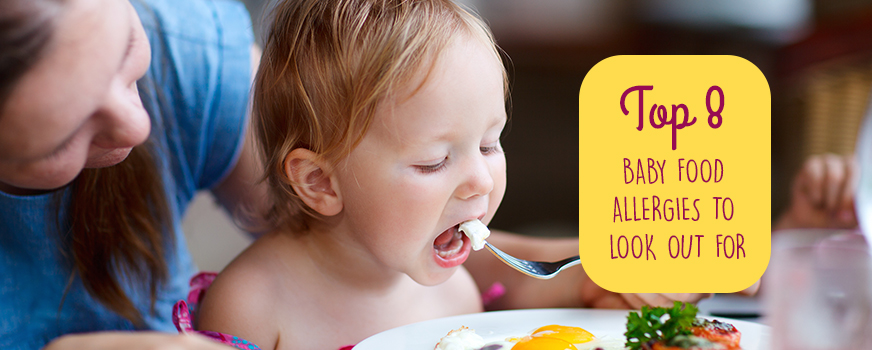
As babies develop, their bodies might not have the built-up tolerances against food allergens like adults do. Introducing foods to your baby’s diet is an important part of healthy development and ensuring they are safe while eating. Learn more about which common baby food allergies to potentially avoid, which food allergy symptoms to look out for, and how to navigate food with your baby when determining allergies.
What are Food Allergies?
A food allergy is an abnormal response of the body to a certain food. It is important to know that this is different from food intolerance, which does not affect the immune system, although some of the same symptoms may be present. This is one reason why food allergies can be hard to spot in babies. It’s important to know what the symptoms are and how to recognize them in your child. About 3% of infants are allergic to at least one food, and almost 9% of 1-year-olds.
What Causes Baby Food Allergies?
Doctors don’t fully understand why some children develop food allergies and others don’t. However, eczema is one of the earliest markers of someone with allergies. In fact, up to 40 percent of babies with moderate to severe eczema also have food allergies.
A family history of eczema, asthma, and allergies also increases the chances of developing food allergies, and they are at higher risk if they have a close family member with food allergies in particular. This is because some children may inherit the susceptibility to become allergic if they get a bigger share of the genes that predispose them to food allergies. However, allergies are not caused by anything the parents do during pregnancy or while breastfeeding, as it is a genetic condition. Misconceptions state that women should avoid allergenic foods while pregnant or breastfeeding to avoid developing baby food allergies, but it has no actual impact on allergy development.

Baby Food Allergy Symptoms
Mild Cases
Mild food allergy symptoms in your baby may be hard to tell from other ailments. The key is to watch what symptoms tend to happen together and whether they come on soon after eating. If your baby constantly has a certain reaction to certain foods, they might be experiencing baby food allergy symptoms. Mild cases of allergies may look like:
- Stuffy, runny nose
- Sneezing
- Coughing
- Itchy, watery eyes
- Colic
- Itching
- Eczema
- Hives
- Mild facial swelling
- Vomiting
- Diarrhea
- Abdominal pain
Severe Cases
A severe allergic reaction is called anaphylaxis or anaphylactic shock. Anaphylaxis is rare in babies, but severe symptoms may still arise that require immediate medical attention. Do not wait to seek help if your baby is having trouble breathing or has lost consciousness. Severe baby food allergy symptoms may include:
- Wheezing or difficulty breathing
- Swelling of mouth or throat that may impair breathing or swallowing
- Choking from respiratory distress.
- Pale, flushed skin as a sign of dropped blood pressure
- Loss of consciousness
- Sudden onset hives within 2 hours of eating
Common Baby Food Allergies
While there is a range of food allergies a baby could potentially have, the majority of food allergies come from a common list of foods. Approximately 90 percent of all food allergies are caused by the following eight foods:
- Milk
- Eggs
- Wheat
- Soy
- Tree nuts
- Peanuts
- Fish
- Shellfish

Baby Food Allergy Treatment
There is unfortunately no treatment for baby food allergies. However, the majority of children who are allergic to milk, eggs, wheat, or soy outgrow their food allergies by the time they are 5 years old. Although most children “outgrow” their allergies, allergy to peanuts, tree nuts, fish, and shellfish may be lifelong.
It is important to speak with your doctor about an approach to your baby’s allergies. If a food allergy is difficult to pinpoint, your doctor may suggest an elimination diet to see how the body reacts. Do not do this on your own, as it is extremely important for your child to have proper nutrition during their developmental period. Create a diet plan with your doctor and take note of how allergies may be affected by the change in diet.
Introducing Foods to Your Baby
According to the American Academy of Pediatrics, offering your baby allergenic foods is okay starting at four to six months – just be sure to watch for any allergic reaction. Several studies show that the gradual introduction of highly allergenic food after 4-6 months can lead to a lower rate of food allergies. Introduce new foods one at a time, two to three days apart. As you introduce foods to your baby’s diet, record everything that your baby eats for several weeks as well as any related symptoms.
If any concerning patterns arise or if you have any questions about how to manage baby food allergies, be sure to speak with your doctor for the best information on how to move forward. In the event of severe symptoms, call 911 immediately to get quick medical attention.



